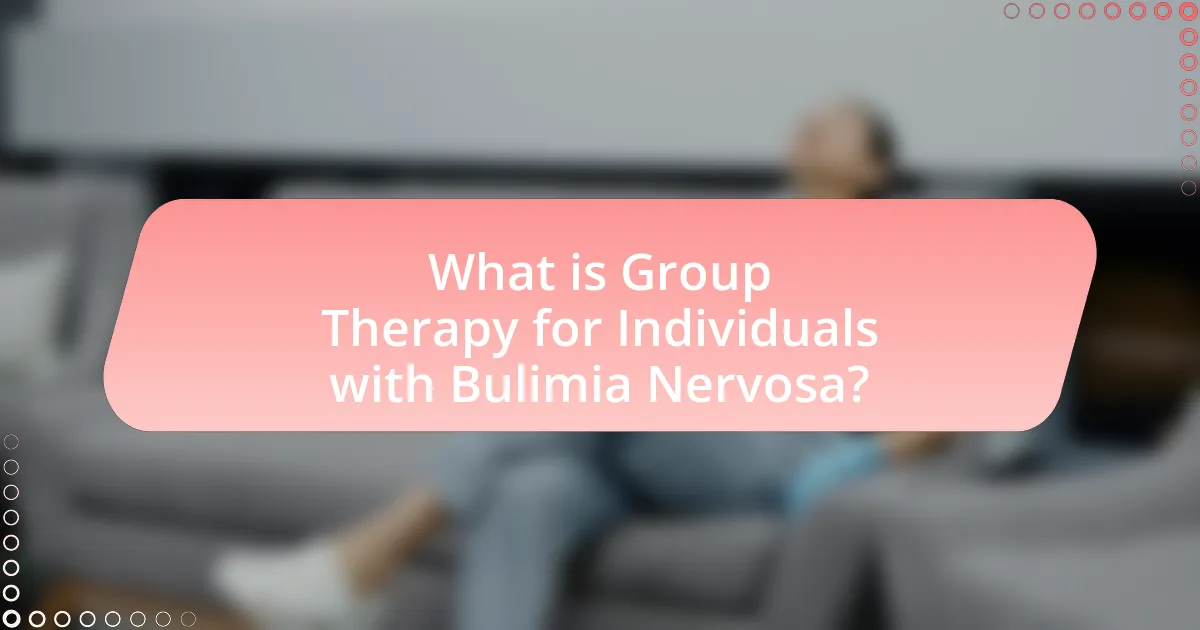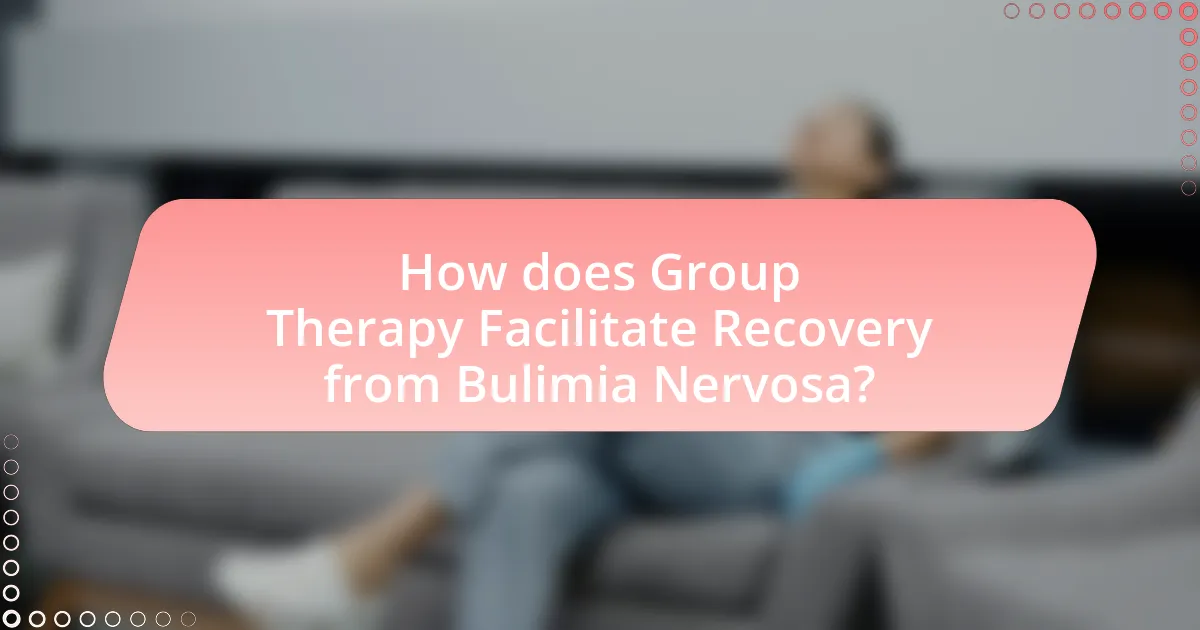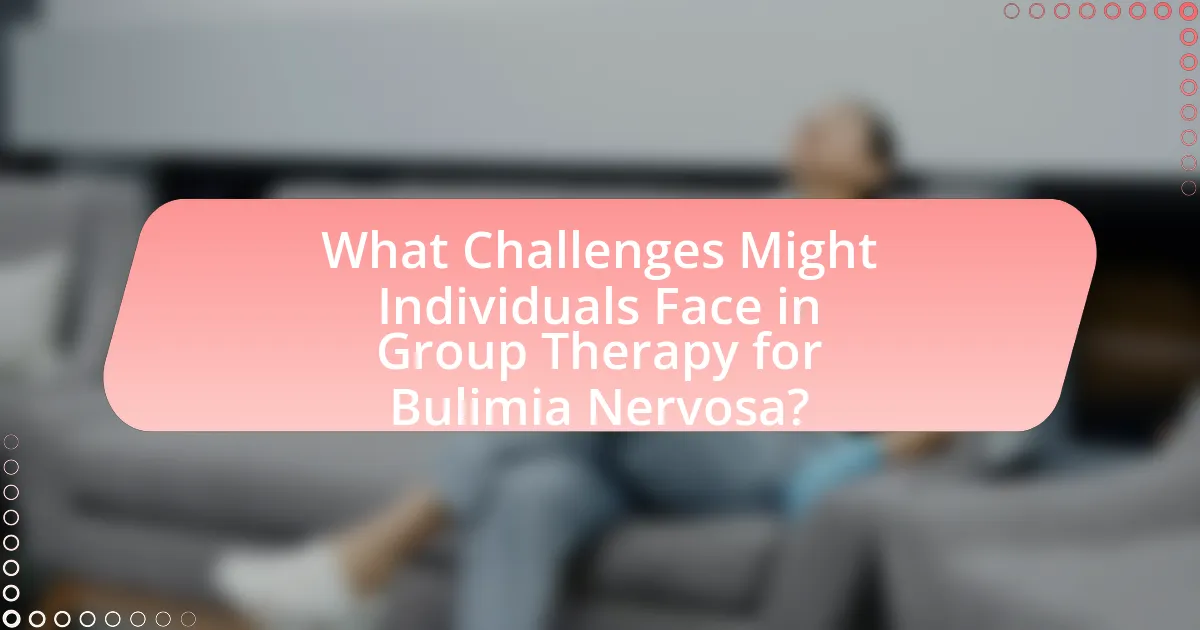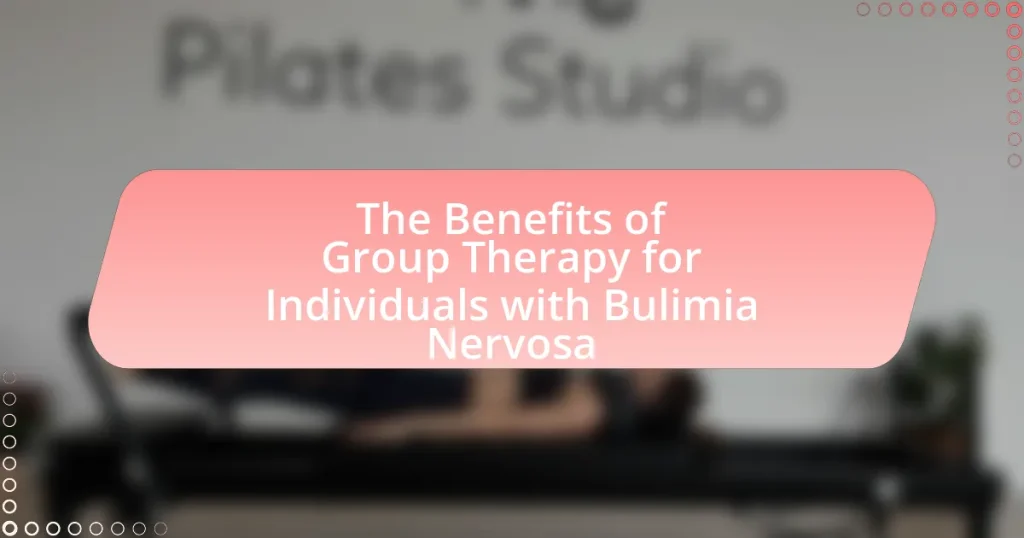Group therapy for individuals with bulimia nervosa is a structured therapeutic approach that fosters community and support among participants facing similar challenges. This article outlines the effectiveness of group therapy in enhancing motivation, improving coping strategies, and providing emotional support, which are crucial for recovery from bulimia nervosa. Key principles such as shared experiences, therapeutic feedback, and the influence of group dynamics are discussed, along with the psychological and social benefits of this treatment modality. Additionally, the article addresses common challenges faced in group therapy, strategies to overcome barriers to participation, and the importance of tailoring therapy to meet individual needs.

What is Group Therapy for Individuals with Bulimia Nervosa?
Group therapy for individuals with bulimia nervosa is a therapeutic approach where participants engage in a structured setting to share experiences and support one another in recovery. This form of therapy allows individuals to connect with others facing similar challenges, fostering a sense of community and reducing feelings of isolation. Research indicates that group therapy can enhance motivation, improve coping strategies, and provide valuable feedback from peers, which can be crucial for recovery. Studies have shown that group therapy can lead to significant reductions in bulimic symptoms and improve overall psychological well-being, making it an effective component of treatment for bulimia nervosa.
How does group therapy specifically address bulimia nervosa?
Group therapy specifically addresses bulimia nervosa by providing a supportive environment where individuals can share their experiences and challenges related to the disorder. This therapeutic setting fosters a sense of community, reducing feelings of isolation that often accompany bulimia. Participants benefit from hearing others’ stories, which can normalize their experiences and promote understanding of the disorder. Research indicates that group therapy can enhance motivation for recovery, as individuals witness the progress of peers, reinforcing their own commitment to change. Additionally, group therapy often incorporates cognitive-behavioral techniques that help participants identify and challenge harmful thoughts and behaviors associated with bulimia, leading to improved coping strategies and emotional regulation.
What are the key principles of group therapy in this context?
The key principles of group therapy for individuals with bulimia nervosa include support, shared experiences, and therapeutic feedback. Support is crucial as it fosters a safe environment where participants can express their feelings and struggles without judgment. Shared experiences allow individuals to realize they are not alone in their challenges, which can reduce feelings of isolation and shame. Therapeutic feedback from both peers and facilitators helps individuals gain new perspectives and insights into their behaviors and thought patterns. These principles are supported by research indicating that group therapy can enhance emotional regulation and improve coping strategies among individuals with eating disorders, as evidenced by studies showing significant reductions in bulimic symptoms following group interventions.
How does the group dynamic influence recovery from bulimia nervosa?
Group dynamics significantly influence recovery from bulimia nervosa by providing social support, fostering accountability, and enhancing motivation among participants. In group therapy settings, individuals share experiences and challenges, which can reduce feelings of isolation and promote a sense of belonging. Research indicates that social support is crucial for recovery, as it can lead to improved emotional well-being and decreased symptoms of eating disorders. A study published in the Journal of Eating Disorders found that participants in group therapy reported higher levels of motivation and commitment to recovery compared to those receiving individual therapy. This collective environment encourages individuals to confront their issues collaboratively, leading to more effective coping strategies and a greater likelihood of sustained recovery.
What are the psychological benefits of group therapy for bulimia nervosa?
Group therapy for bulimia nervosa offers significant psychological benefits, including enhanced emotional support, improved self-esteem, and reduced feelings of isolation. Participants in group therapy often experience a sense of belonging and validation as they share their struggles with others facing similar challenges, which can lead to decreased anxiety and depression. Research indicates that group therapy can foster interpersonal skills and provide constructive feedback, helping individuals develop healthier coping mechanisms. A study published in the Journal of Eating Disorders found that group therapy significantly improved participants’ body image and reduced binge-eating episodes, demonstrating its effectiveness in addressing the psychological aspects of bulimia nervosa.
How does group therapy promote emotional support among participants?
Group therapy promotes emotional support among participants by creating a safe environment where individuals can share their experiences and feelings. This shared vulnerability fosters a sense of belonging and reduces feelings of isolation, which is crucial for individuals with bulimia nervosa. Research indicates that participants often feel validated and understood when they hear others express similar struggles, leading to increased empathy and connection. A study published in the Journal of Eating Disorders found that group therapy significantly enhances emotional support, as participants report feeling more accepted and less judged, which is essential for recovery from eating disorders.
What role does shared experience play in the therapeutic process?
Shared experience plays a crucial role in the therapeutic process by fostering connection and understanding among individuals facing similar challenges. In group therapy for bulimia nervosa, participants often share their personal stories, which helps to normalize their experiences and reduce feelings of isolation. Research indicates that shared experiences can enhance empathy and support, as individuals realize they are not alone in their struggles. A study published in the Journal of Eating Disorders found that group therapy significantly improved participants’ self-esteem and reduced eating disorder symptoms, highlighting the effectiveness of shared experiences in promoting healing and recovery.
What are the social benefits of group therapy for individuals with bulimia nervosa?
Group therapy provides significant social benefits for individuals with bulimia nervosa, primarily by fostering a sense of community and reducing feelings of isolation. Participants often experience increased social support, as they connect with others who share similar struggles, which can enhance their coping mechanisms and emotional resilience. Research indicates that group therapy can improve interpersonal skills, as individuals learn to communicate their feelings and experiences in a safe environment. Additionally, the shared experiences in group settings can lead to greater empathy and understanding among members, promoting a supportive network that encourages recovery. Studies have shown that individuals engaged in group therapy report higher levels of social connectedness and lower levels of loneliness, which are crucial for mental health and recovery from eating disorders.
How does group therapy help reduce feelings of isolation?
Group therapy helps reduce feelings of isolation by providing a supportive environment where individuals can share their experiences and connect with others facing similar challenges. This shared experience fosters a sense of belonging and community, which is crucial for individuals with bulimia nervosa who often feel alone in their struggles. Research indicates that group therapy can enhance social support, improve interpersonal skills, and reduce feelings of loneliness, as participants realize they are not alone in their experiences. A study published in the Journal of Eating Disorders found that group therapy significantly decreased feelings of isolation among participants, highlighting its effectiveness in promoting emotional connection and support.
What impact does group therapy have on building interpersonal skills?
Group therapy significantly enhances interpersonal skills by providing a structured environment for individuals to interact, communicate, and receive feedback from peers. This setting fosters active listening, empathy, and conflict resolution, which are essential components of effective interpersonal communication. Research indicates that participants in group therapy often report improved social skills and increased confidence in their ability to engage with others, as they practice these skills in real-time with diverse group members. A study published in the Journal of Counseling Psychology found that group therapy participants demonstrated a 30% increase in social interaction skills after a series of sessions, highlighting the effectiveness of this therapeutic approach in building interpersonal competencies.

How does Group Therapy Facilitate Recovery from Bulimia Nervosa?
Group therapy facilitates recovery from bulimia nervosa by providing a supportive environment where individuals can share experiences and learn from one another. This collective approach fosters a sense of belonging and reduces feelings of isolation, which are common in those suffering from eating disorders. Research indicates that group therapy can enhance motivation for recovery, as participants witness others’ progress and gain insights into their own behaviors. Additionally, group therapy often incorporates cognitive-behavioral techniques that help individuals challenge and change harmful thought patterns related to food and body image. Studies have shown that group therapy can lead to significant reductions in bulimic symptoms and improve overall psychological well-being, making it an effective component of treatment for bulimia nervosa.
What techniques are commonly used in group therapy for bulimia nervosa?
Common techniques used in group therapy for bulimia nervosa include cognitive-behavioral therapy (CBT), interpersonal therapy (IPT), and psychoeducation. CBT focuses on identifying and changing negative thought patterns and behaviors related to eating and body image, which has been shown to reduce bulimic symptoms effectively. IPT emphasizes improving interpersonal relationships and communication skills, helping individuals address social factors contributing to their eating disorder. Psychoeducation provides information about bulimia nervosa, its effects, and coping strategies, which enhances participants’ understanding and promotes recovery. These techniques are supported by research indicating their effectiveness in treating bulimia nervosa within a group setting, fostering a supportive environment for individuals to share experiences and learn from one another.
How do cognitive-behavioral strategies function in a group setting?
Cognitive-behavioral strategies in a group setting function by facilitating shared learning and support among participants, which enhances individual therapeutic outcomes. In group therapy for bulimia nervosa, these strategies encourage members to identify and challenge distorted thoughts related to body image and eating behaviors collectively. Research indicates that group dynamics can foster accountability and motivation, as individuals witness others’ progress and share coping techniques, leading to improved adherence to treatment protocols. A study published in the “International Journal of Eating Disorders” by Wilson et al. (2010) found that group cognitive-behavioral therapy significantly reduced binge-eating episodes and improved psychological well-being among participants, demonstrating the effectiveness of these strategies in a collaborative environment.
What role does mindfulness play in group therapy sessions?
Mindfulness plays a crucial role in group therapy sessions by enhancing participants’ awareness of their thoughts and feelings, which is particularly beneficial for individuals with bulimia nervosa. This practice encourages individuals to observe their emotional and physical states without judgment, fostering a supportive environment where they can share experiences and coping strategies. Research indicates that mindfulness can reduce symptoms of anxiety and depression, which are often comorbid with bulimia nervosa, thereby improving overall treatment outcomes. A study published in the Journal of Eating Disorders found that mindfulness-based interventions significantly decreased binge-eating episodes and improved emotional regulation among participants, highlighting its effectiveness in group therapy settings.
How does group therapy enhance motivation for recovery?
Group therapy enhances motivation for recovery by providing a supportive environment where individuals can share experiences and receive encouragement from peers facing similar challenges. This collective experience fosters a sense of belonging and reduces feelings of isolation, which are common in individuals with bulimia nervosa. Research indicates that social support is crucial for motivation; a study published in the Journal of Consulting and Clinical Psychology found that participants in group therapy reported higher levels of motivation and commitment to recovery compared to those who engaged in individual therapy. The shared accountability within the group also encourages individuals to set and achieve personal recovery goals, reinforcing their motivation to change.
What factors contribute to increased motivation within a group?
Increased motivation within a group is primarily influenced by shared goals, social support, and positive reinforcement. Shared goals create a sense of purpose and direction, encouraging members to work collaboratively towards a common objective. Social support fosters a sense of belonging and reduces feelings of isolation, which is particularly important for individuals with bulimia nervosa, as they often struggle with feelings of shame and loneliness. Positive reinforcement, such as acknowledgment of progress and achievements, boosts individual confidence and encourages continued participation. Research indicates that group therapy settings, where these factors are prevalent, can significantly enhance motivation and engagement among participants, leading to better treatment outcomes for conditions like bulimia nervosa.
How do accountability and encouragement manifest in group therapy?
Accountability and encouragement in group therapy manifest through shared responsibility and supportive interactions among participants. In group therapy, individuals are encouraged to set personal goals and share their progress, which fosters accountability as members hold each other responsible for their commitments. This dynamic creates a safe environment where participants can openly discuss their challenges and successes, reinforcing their motivation to adhere to treatment plans. Research indicates that group therapy can enhance motivation and adherence to recovery strategies, particularly for individuals with bulimia nervosa, as the collective support and accountability significantly improve treatment outcomes.

What Challenges Might Individuals Face in Group Therapy for Bulimia Nervosa?
Individuals may face several challenges in group therapy for bulimia nervosa, including feelings of shame and vulnerability. These emotions can hinder open communication, making it difficult for participants to share their experiences and struggles. Additionally, the presence of others discussing their eating disorders may trigger comparisons and feelings of inadequacy, which can exacerbate symptoms. Research indicates that group dynamics can lead to competition among members regarding recovery progress, further complicating the therapeutic process. Furthermore, individuals may struggle with trust issues, making it hard to form supportive relationships within the group. These challenges can impede the effectiveness of group therapy, highlighting the need for skilled facilitation to address such issues.
What are common barriers to participation in group therapy?
Common barriers to participation in group therapy include stigma, fear of judgment, logistical issues, and lack of motivation. Stigma surrounding mental health can prevent individuals from seeking help, as they may worry about being labeled or misunderstood. Fear of judgment from peers in the group can lead to anxiety about sharing personal experiences. Logistical issues, such as transportation difficulties or scheduling conflicts, can also hinder attendance. Additionally, a lack of motivation or belief in the effectiveness of group therapy can deter individuals from participating. These barriers are supported by research indicating that stigma and logistical challenges are frequently cited by individuals as reasons for not engaging in therapeutic settings.
How can fear of judgment affect an individual’s willingness to join?
Fear of judgment can significantly reduce an individual’s willingness to join group therapy for bulimia nervosa. This fear often stems from concerns about being criticized or misunderstood by peers, which can lead to feelings of shame and isolation. Research indicates that individuals with eating disorders frequently experience heightened sensitivity to social evaluation, making them more apprehensive about participating in group settings. For instance, a study published in the Journal of Eating Disorders found that social anxiety is prevalent among individuals with bulimia, which directly correlates with their reluctance to engage in group therapy. Consequently, this fear can hinder their access to support and recovery resources essential for overcoming bulimia nervosa.
What strategies can help overcome these barriers?
Strategies to overcome barriers in group therapy for individuals with bulimia nervosa include fostering a supportive environment, enhancing communication skills, and providing education about the disorder. Creating a safe space encourages open dialogue, which is essential for participants to share their experiences and feelings without fear of judgment. Improving communication skills helps individuals express their thoughts and emotions more effectively, facilitating better interactions within the group. Additionally, educating participants about bulimia nervosa can demystify the disorder, reduce stigma, and promote understanding among group members, ultimately leading to more effective therapy outcomes. Research indicates that these strategies can significantly enhance the therapeutic experience and improve recovery rates for individuals with eating disorders.
How can group therapy be tailored to meet individual needs?
Group therapy can be tailored to meet individual needs by incorporating personalized treatment goals, diverse therapeutic techniques, and ongoing assessments of participant progress. Individualized treatment goals allow therapists to address specific issues related to bulimia nervosa, such as emotional regulation or coping strategies. Utilizing various therapeutic techniques, such as cognitive-behavioral therapy or mindfulness practices, can cater to different learning styles and preferences among group members. Additionally, regular assessments and feedback from participants enable therapists to adjust the group dynamics and focus areas, ensuring that each individual’s needs are continuously met throughout the therapy process. This approach is supported by research indicating that personalized interventions in group settings can enhance treatment outcomes for individuals with eating disorders.
What factors should be considered when forming a group?
When forming a group for therapy, especially for individuals with Bulimia Nervosa, several critical factors must be considered. These include the group’s size, which should ideally be small to facilitate intimate discussions and personal sharing; the members’ shared experiences, ensuring that participants can relate to each other’s struggles; and the qualifications of the facilitator, who should possess expertise in eating disorders and group dynamics. Additionally, the group’s goals must be clearly defined to align with the therapeutic needs of the participants. Research indicates that groups with these characteristics can enhance support and foster recovery, as evidenced by studies showing improved outcomes in structured group therapy settings for eating disorders.
How can facilitators ensure a safe and supportive environment?
Facilitators can ensure a safe and supportive environment by establishing clear ground rules and fostering open communication among group members. Clear ground rules create a framework for respectful interactions, which is essential in group therapy settings, especially for individuals with Bulimia Nervosa who may be vulnerable. Open communication encourages participants to express their feelings and experiences without fear of judgment, promoting trust and safety. Research indicates that a supportive environment significantly enhances therapeutic outcomes, as individuals are more likely to engage and share when they feel secure and respected.
What practical tips can enhance the effectiveness of group therapy for bulimia nervosa?
To enhance the effectiveness of group therapy for bulimia nervosa, establishing a safe and supportive environment is crucial. This can be achieved by fostering open communication, where participants feel comfortable sharing their experiences without judgment. Additionally, incorporating structured sessions that include specific topics related to bulimia, such as coping strategies and emotional regulation, can provide focused support. Research indicates that group cohesion significantly impacts treatment outcomes; therefore, activities that promote bonding among members can enhance trust and engagement. Furthermore, setting clear goals for each session helps participants stay focused and accountable, which is essential for progress.


